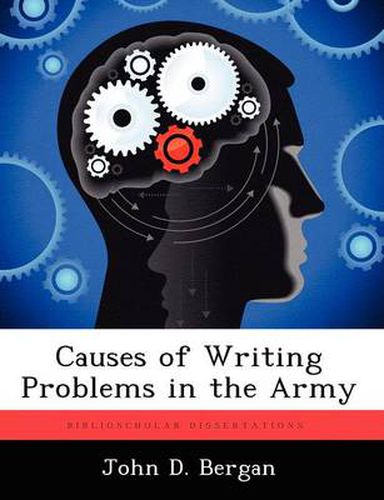Readings Newsletter
Become a Readings Member to make your shopping experience even easier.
Sign in or sign up for free!
You’re not far away from qualifying for FREE standard shipping within Australia
You’ve qualified for FREE standard shipping within Australia
The cart is loading…






This title is printed to order. This book may have been self-published. If so, we cannot guarantee the quality of the content. In the main most books will have gone through the editing process however some may not. We therefore suggest that you be aware of this before ordering this book. If in doubt check either the author or publisher’s details as we are unable to accept any returns unless they are faulty. Please contact us if you have any questions.
Military writing has been criticized for being stilted, verbose, and ambiguous; such poor writing is pejoratively called pentagonese or militarese. The army has made numerous attempts to improve its written communications because it recognizes that its writing problems cause loss of money and man hours as well as critical delays and confusion. However, those attempted solutions did not follow from a comprehensive study of the causes of the problems. This study identifies the causes of the writing problems of army officers. The thesis considers the effects of ability, attitude, and pressures on army writing. First, it seeks to determine whether the problems are caused by a basic lack of writing ability in the officer corps. The study then attempts to understand if the source of that cause lies in the education, either civilian or military, of the officer or if it is due to a lack of opportunity to acquire necessary writing experience in the early stages of a military career. The attitudes of the military profession are also analyzed to determine the general writing preferences and aversions of army officers and to consider whether the military evaluation system reinforces positive writing attitudes. Finally, the various pressures which might adversely affect organizational writing are examined to determine if they are operating within the military organization. These pressures are categorized as environmental, managerial, or personal, depending on their source. Such a comprehensive study of ability, attitude, and pressures within the military profession should provide an insight into the causes of poor army writing.
$9.00 standard shipping within Australia
FREE standard shipping within Australia for orders over $100.00
Express & International shipping calculated at checkout
This title is printed to order. This book may have been self-published. If so, we cannot guarantee the quality of the content. In the main most books will have gone through the editing process however some may not. We therefore suggest that you be aware of this before ordering this book. If in doubt check either the author or publisher’s details as we are unable to accept any returns unless they are faulty. Please contact us if you have any questions.
Military writing has been criticized for being stilted, verbose, and ambiguous; such poor writing is pejoratively called pentagonese or militarese. The army has made numerous attempts to improve its written communications because it recognizes that its writing problems cause loss of money and man hours as well as critical delays and confusion. However, those attempted solutions did not follow from a comprehensive study of the causes of the problems. This study identifies the causes of the writing problems of army officers. The thesis considers the effects of ability, attitude, and pressures on army writing. First, it seeks to determine whether the problems are caused by a basic lack of writing ability in the officer corps. The study then attempts to understand if the source of that cause lies in the education, either civilian or military, of the officer or if it is due to a lack of opportunity to acquire necessary writing experience in the early stages of a military career. The attitudes of the military profession are also analyzed to determine the general writing preferences and aversions of army officers and to consider whether the military evaluation system reinforces positive writing attitudes. Finally, the various pressures which might adversely affect organizational writing are examined to determine if they are operating within the military organization. These pressures are categorized as environmental, managerial, or personal, depending on their source. Such a comprehensive study of ability, attitude, and pressures within the military profession should provide an insight into the causes of poor army writing.